Monastic Envisions Bellingham-area Retreat Site
Written by: Rich Hill
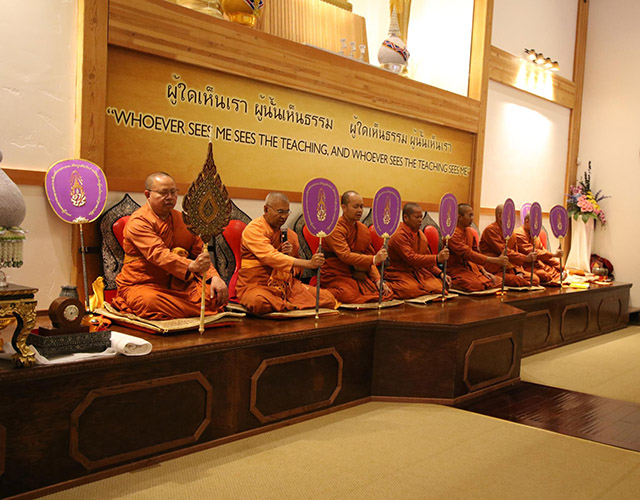
Monastics at Wat Atamma meditate and conduct ceremonies together, but have insufficient chance for long retreat.
Photos by: Rich Hill, Steve Wilhelm
Thai monk Ajahn Ritthi intends to build a Bellingham-area retreat center, to support the extended-retreat needs of regional Thai monastics as well as lay practitioners.
Ritthi, who is known for successfully and energetically taking on large dhamma projects, recently shared his vision for the retreat center with a visitor at Wat Atamma Monastery in Woodinville, a small city northeast of Seattle.
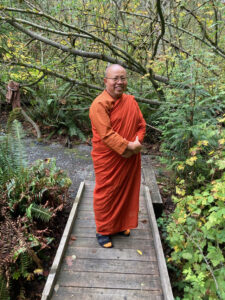
Ajahn Ritthi on Wat Atamma walking path.
As abbot of Wat Atamma, Ritthi for nine years led the project to develop the monastery. He and supporters gradually overcame significant resistance among some Woodinville neighbors, not to mention the high cost of building the monastery. Now he’s ready for a new challenge.
While Atamma Monastery is very active, offering weekly meditation gatherings and occasional weekend meditation retreats, Ritthi said it cannot offer the facilities, nor the quiet, that are needed for monks and lay people to complete extended retreats.
Ajahn Ritthi hopes to remedy this limitation by acquiring a secluded retreat site in the Bellingham area. He believes such a site would be relatively close to the Seattle Thai community, but also accessible to Canadian Buddhists wanting to engage in extended secluded retreat.
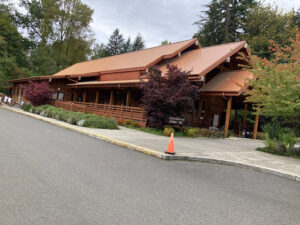
Wat Atamma meditation hall supports Thai and Western practitioners, but isn’t suited for long retreat.
Wat Atamma occupies five acres in a residentially-zoned part of Woodinville. The facility includes a main building containing a meditation hall and meeting room, and a separate residence to house six to eight monks.
The monastery serves primarily the local Thai community, which convenes on Sundays for chanting, meditation, and dhamma talks.
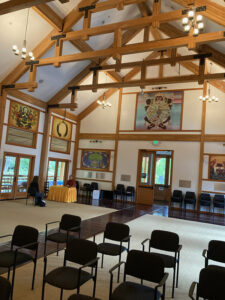
Inside the Wat Atamma meditation hall, with its extensive graphics.
Every day Thai volunteers offer meals to the monks. In addition, frequently members of the Thai community visit the monastery to tend the property’s gardens, and to walk the path through the woods that buffer the monastery from the surrounding residential homes.
Ajahn Ritthi’s vision is to purchase property, within a few miles of downtown Bellingham, which would include an existing residence. That structure could house one or two monks permanently, and could provide temporary space for several others’ extended practice.
Over time he would like to build several “kutis” (meditation huts) on the land, so that up to 20 practitioners could benefit from extended meditation practice.
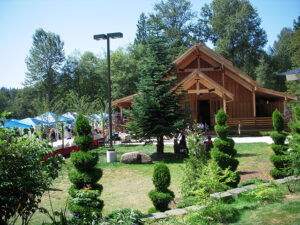
The current facility opened in 2012, after 15 years of effort, to extensive celebrations.
Ajahn Ritthi concedes there are challenges to be overcome. The cost of property in the Bellingham area has risen dramatically recently, and few sites are secluded enough, and large enough, for a retreat center.
Funding to buy the property and develop it to meet the needs of retreatants has not yet been identified. A plan to provide meals for the monks will also be needed.
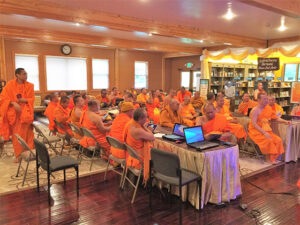
Thai monks in a conference, during the 2018 national monastic gathering.
But Ajahn Ritthi said he is confident these challenges can be surmounted. The local Thai community is generous and enterprising, he said, pointing out that the Woodinville monastery has thrived for over 20 years, and that the community raised more than $2 million to build the main meditation hall.
Ajahn Ritthi is optimistic similar support will enable acquisition of property for a Whatcom County retreat center. And with over 20 Thai restaurants in the Bellingham area, he said he is not concerned about the availability of food for the monks.
As our interview concluded, Ajahn Ritthi, with sparkling eyes and contagious enthusiasm, invited this reporter to be one of the first retreatants at the Whatcom County Wat Atamma retreat center.
Rich Hill is a long-time student of Theravada and Mahayana Buddhism. He is currently a member of the Blue Heron Zen Community sangha in Seattle.
